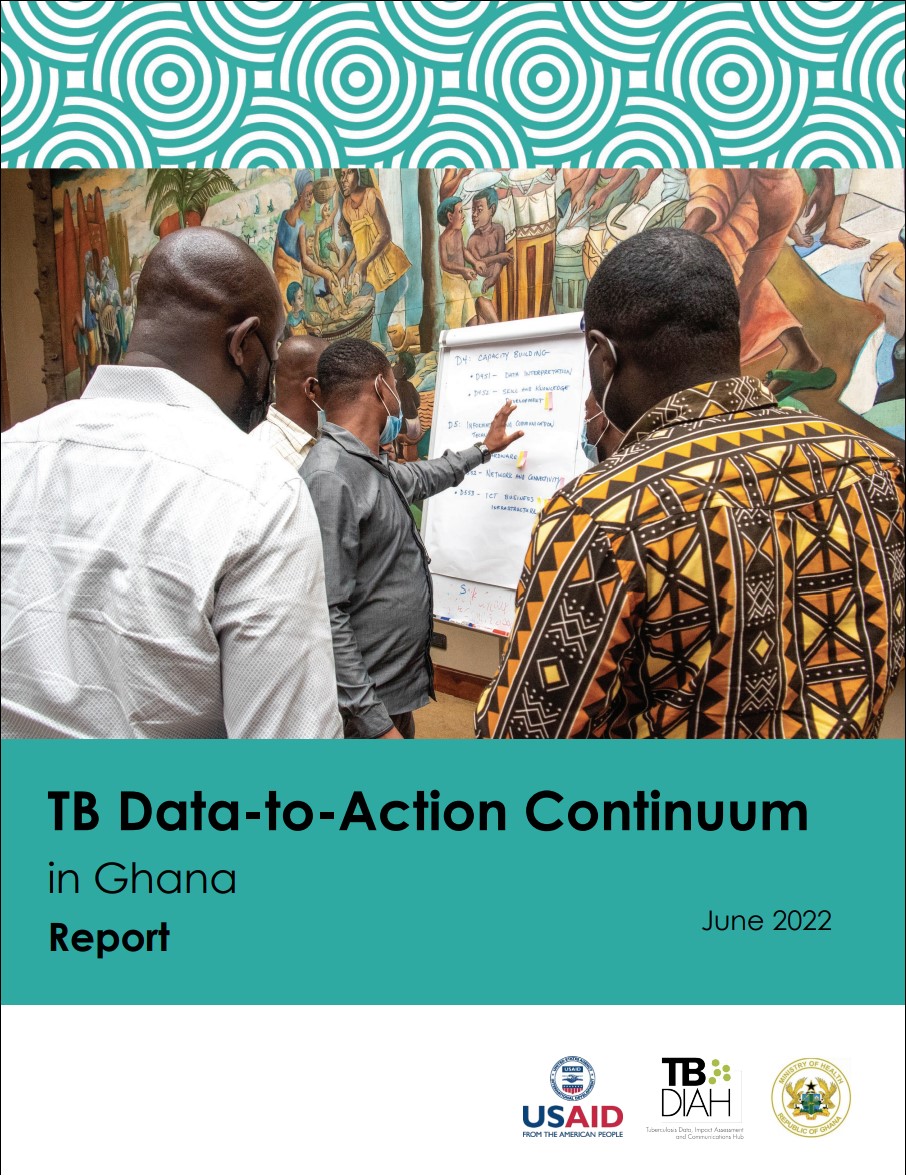TB Data-to-Action Continuum in Ghana

Citation: Chauffour, J., Silver, M., Boone, D., Alebachew Wagaw, Z. (2022). TB Data-to-Action Continuum in Ghana: Report. Chapel Hill, NC, USA: TB DIAH, University of North Carolina.
Abstract: A strong tuberculosis (TB) monitoring and evaluation (M&E) and surveillance system is a vital tool for countries to reach global goals to end TB. The United States Agency for International Development (USAID) leads the U.S. Government’s global efforts to end TB. USAID’s Global Accelerator to End TB is the Agency’s programmatic approach to fight TB. Under the Accelerator, USAID funds the TB Data, Impact Assessment and Communications Hub (TB DIAH) project, which developed a TB Data-to-Action Continuum (D2AC) Toolkit to measure countries’ progress and guide efforts to improve their TB M&E and surveillance systems. The D2AC allows national TB programs (NTPs) to precisely gauge the barriers to data use and assess the decision-making capabilities of different actors across their health systems. The purpose of a D2AC workshop is to guide the evaluation of data use capabilities to routinely monitor and improve data use attributes associated with TB program management and service delivery at subnational and national levels.
Ghana was selected as the first field test location for the D2AC workshop. The workshop was held in March 2022 in Accra. Twenty-six participants attended, representing all levels of the Ghana health system and other TB stakeholder groups. The D2AC workshop was conducted using a hybrid approach (virtual facilitators, all participants gathered in one room). The D2AC team applied a mixed methods approach conducted in three parts with the support of the D2AC Toolkit: (1) participants first completed the D2AC Toolkit’s data collection instrument individually and then in groups; (2) individually and then in groups, participants provided evidence and justification in the data collection instrument for the response options selected; and (3) in groups, participants identified priority actions for post-workshop implementation. A semi-structured questionnaire and focus group discussion method were implemented during the assessment.
The D2AC assessment in Ghana shed light on the perceived weaknesses of the Ghana TB system, primarily in the domain of information and communications technology (ICT), where hardware, network and connectivity, and ICT business infrastructure received the lowest scores across the groups, on average. Important hardware needs were identified at facility, district, and regional levels, and network and connectivity issues were found to impact weekly, monthly, or other reporting. Beyond the challenges around physical resources, equipment, and infrastructure, other challenges identified related to human resources, such as organizational structure and function, and skill and knowledge development. In terms of the ongoing COVID-19 pandemic, capacity building of health workers on bidirectional screening and testing for COVID-19 was of priority concern for the Ghana NTP. Last, a third broad category in which improvements could be made concerned data management and use practices, functionalities, and capabilities, specifically: data integration; data exchange and interoperability; data use guidance; and analytics and data visualization. The D2AC assessment in Ghana also shed light on the areas of the D2AC scale that were performing the strongest. They included aspects of data availability practices, such as data reporting, and data access and sharing. Other strong areas were monitoring, evaluation, and learning (MEL) and leadership and coordination.
Ghana was selected as the first field test location for the D2AC workshop. The workshop was held in March 2022 in Accra. Twenty-six participants attended, representing all levels of the Ghana health system and other TB stakeholder groups. The D2AC workshop was conducted using a hybrid approach (virtual facilitators, all participants gathered in one room). The D2AC team applied a mixed methods approach conducted in three parts with the support of the D2AC Toolkit: (1) participants first completed the D2AC Toolkit’s data collection instrument individually and then in groups; (2) individually and then in groups, participants provided evidence and justification in the data collection instrument for the response options selected; and (3) in groups, participants identified priority actions for post-workshop implementation. A semi-structured questionnaire and focus group discussion method were implemented during the assessment.
The D2AC assessment in Ghana shed light on the perceived weaknesses of the Ghana TB system, primarily in the domain of information and communications technology (ICT), where hardware, network and connectivity, and ICT business infrastructure received the lowest scores across the groups, on average. Important hardware needs were identified at facility, district, and regional levels, and network and connectivity issues were found to impact weekly, monthly, or other reporting. Beyond the challenges around physical resources, equipment, and infrastructure, other challenges identified related to human resources, such as organizational structure and function, and skill and knowledge development. In terms of the ongoing COVID-19 pandemic, capacity building of health workers on bidirectional screening and testing for COVID-19 was of priority concern for the Ghana NTP. Last, a third broad category in which improvements could be made concerned data management and use practices, functionalities, and capabilities, specifically: data integration; data exchange and interoperability; data use guidance; and analytics and data visualization. The D2AC assessment in Ghana also shed light on the areas of the D2AC scale that were performing the strongest. They included aspects of data availability practices, such as data reporting, and data access and sharing. Other strong areas were monitoring, evaluation, and learning (MEL) and leadership and coordination.
This report shares more on the workshop and recommendations.
Shortname: TR-22-480-TB
Author(s): Jeanne Chauffour, MS; Meredith Silver, MPH; David Boone, PhD; Zeleke Alebachew Wagaw, MPH
Year: 2022
Language: English
Region(s): GHANA
Resource Type: Reports
Source: TB DIAH
